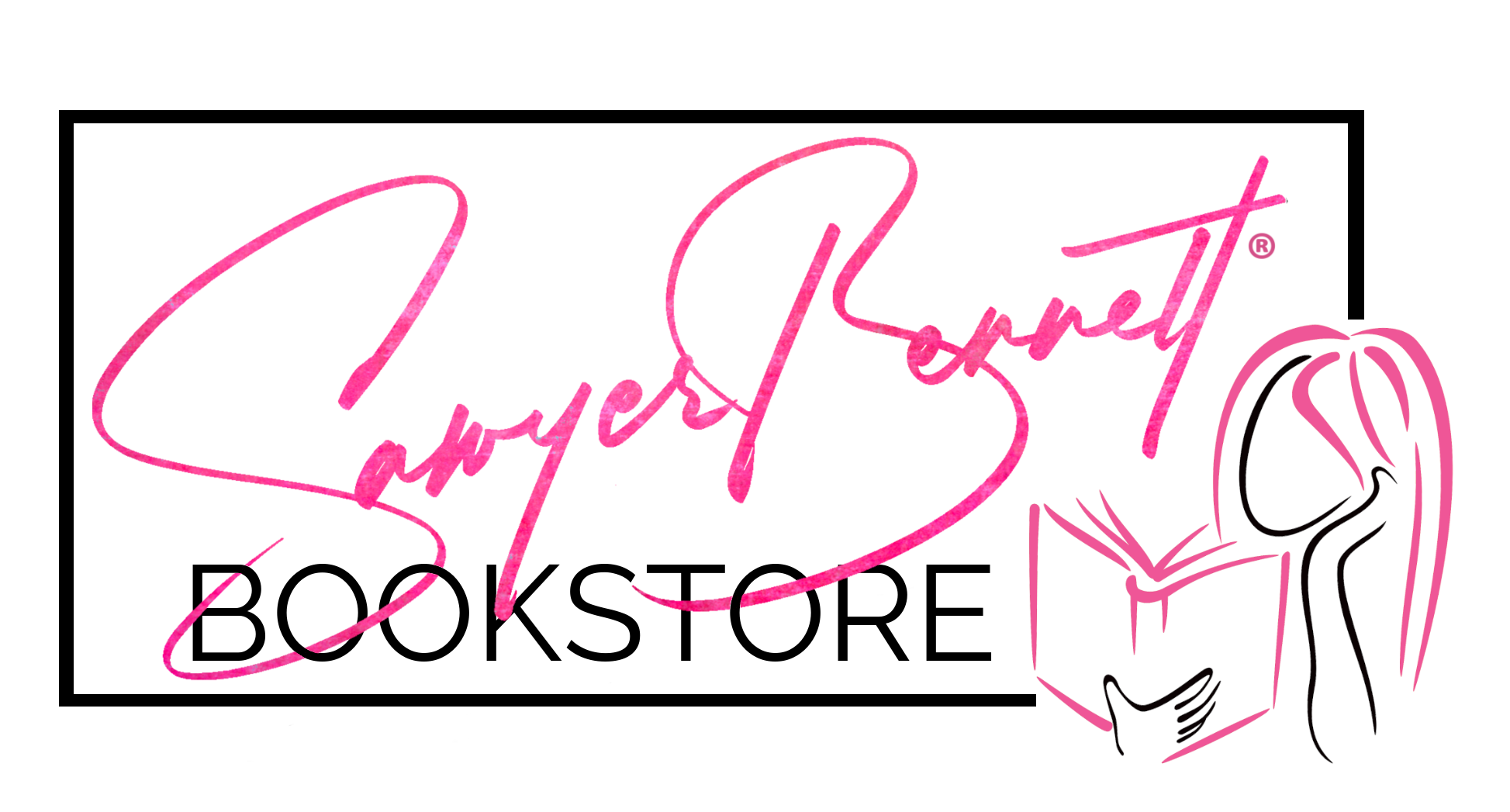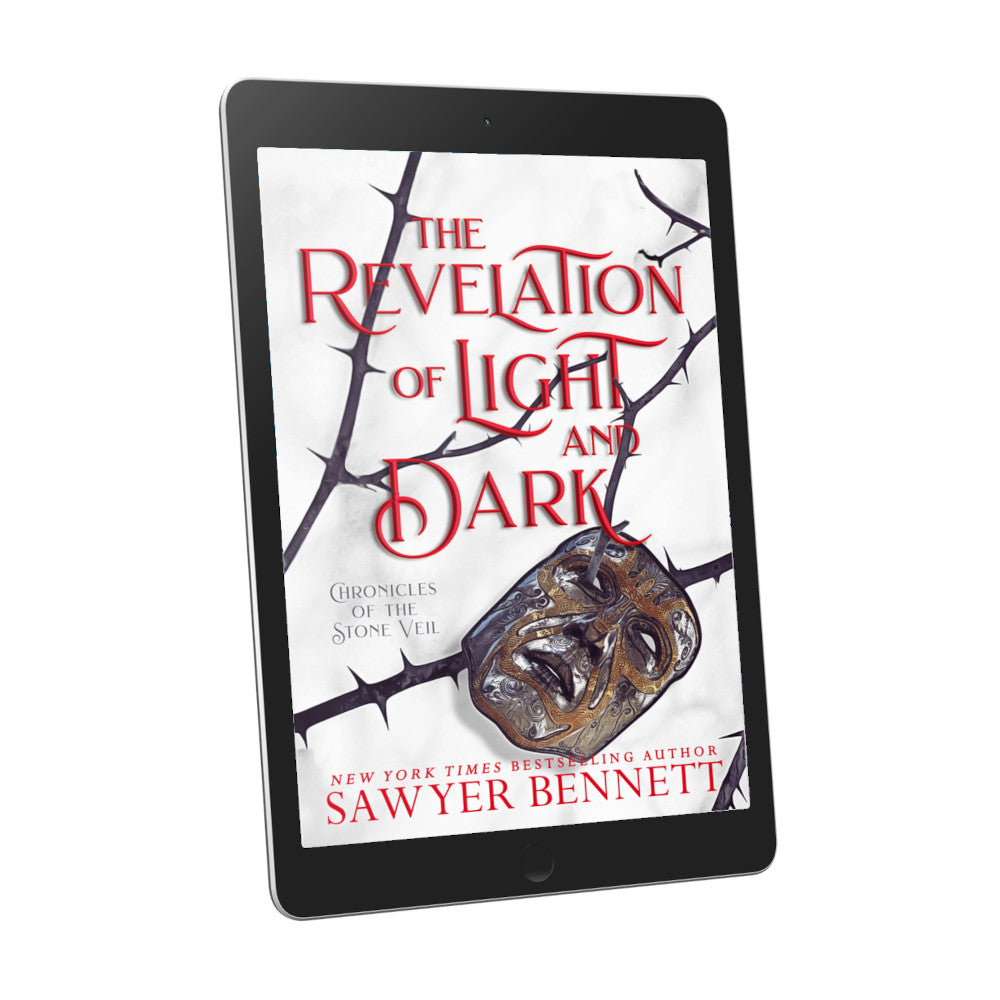
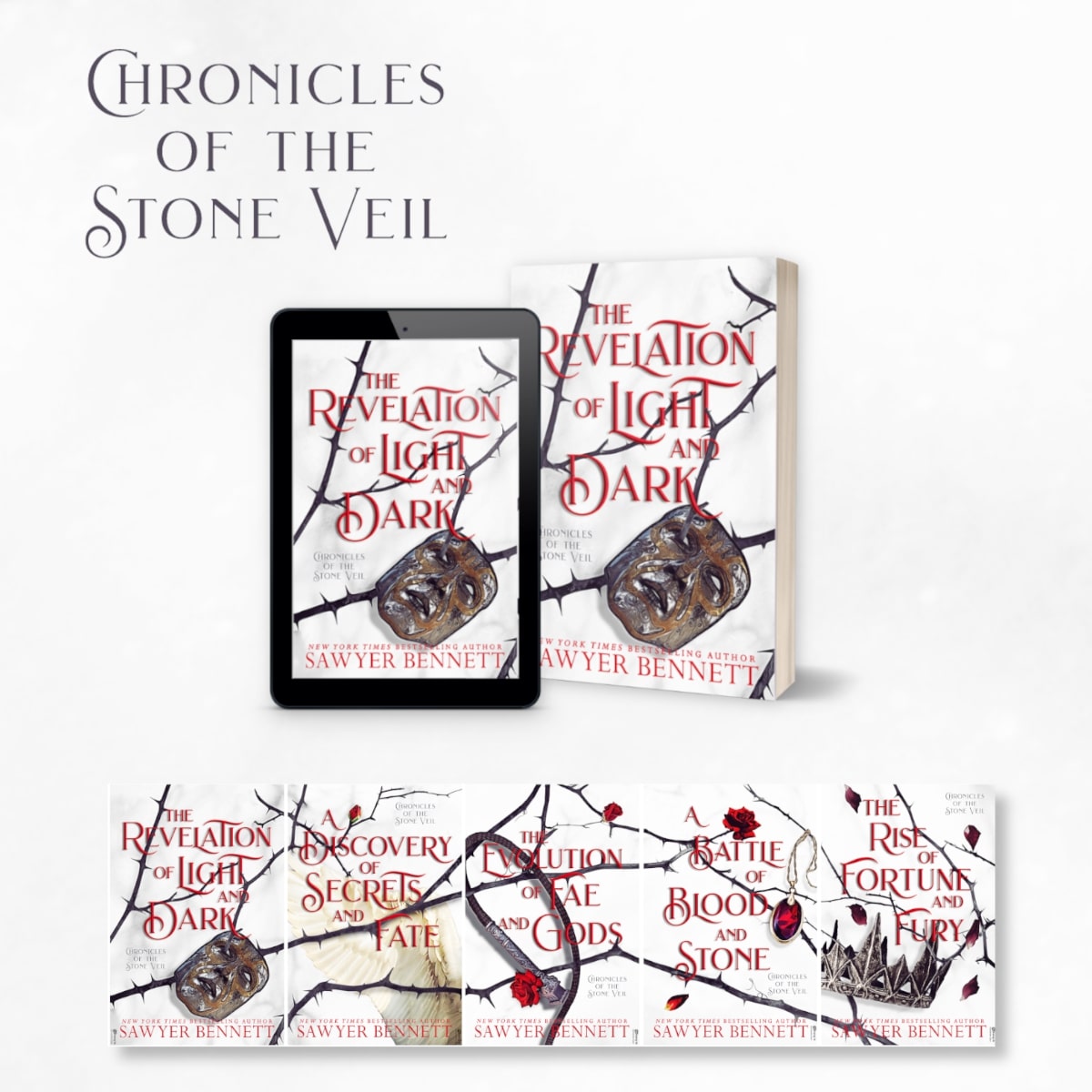
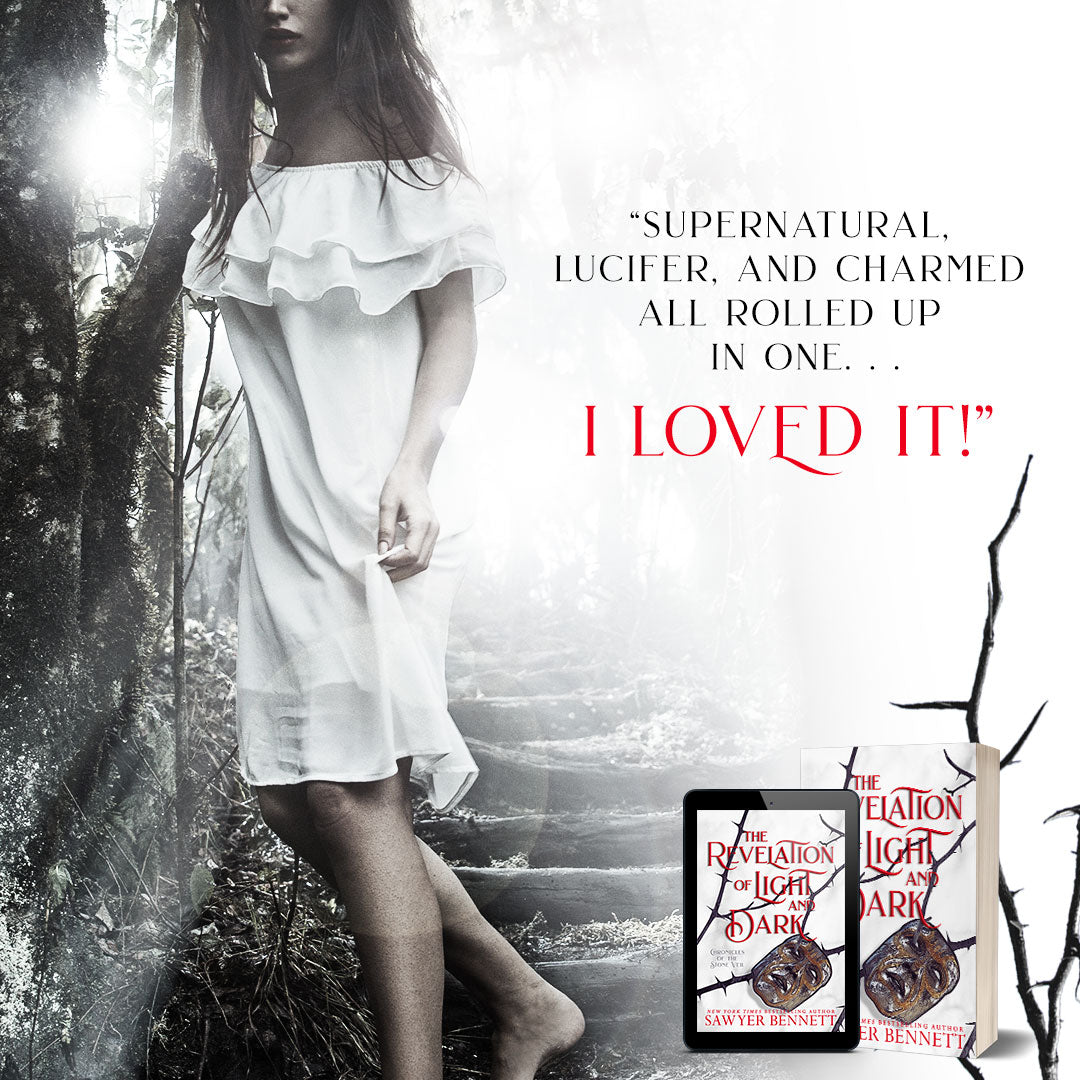
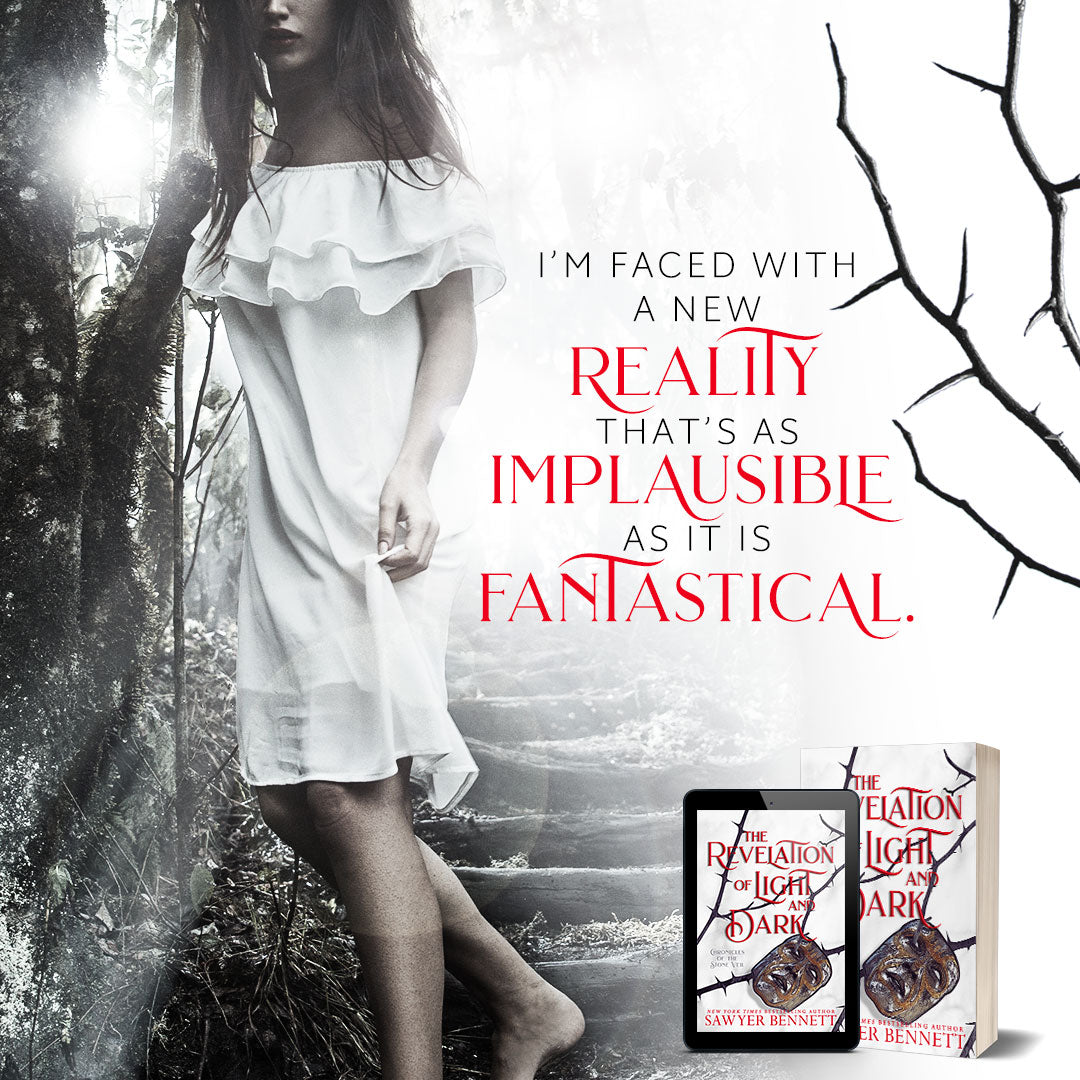
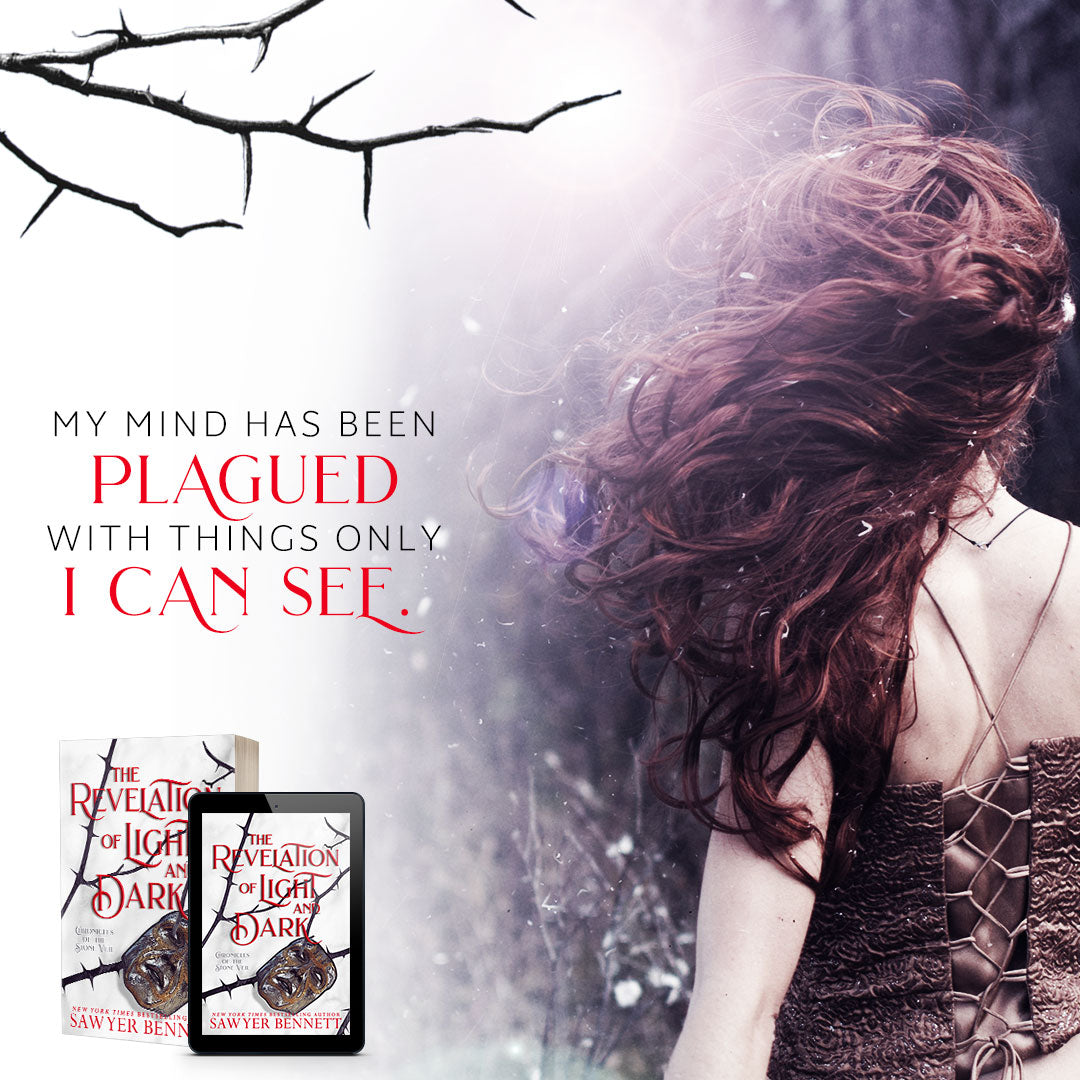
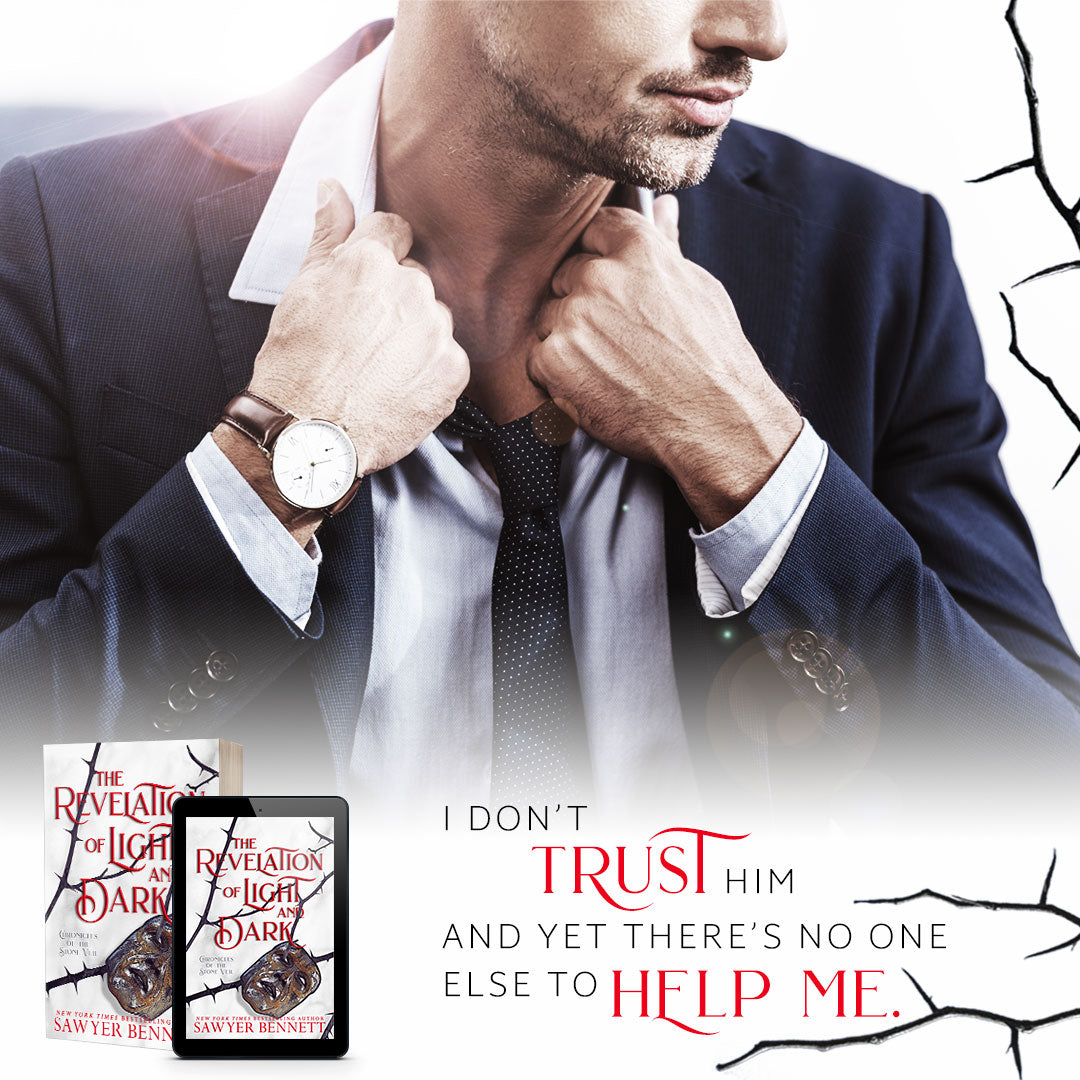
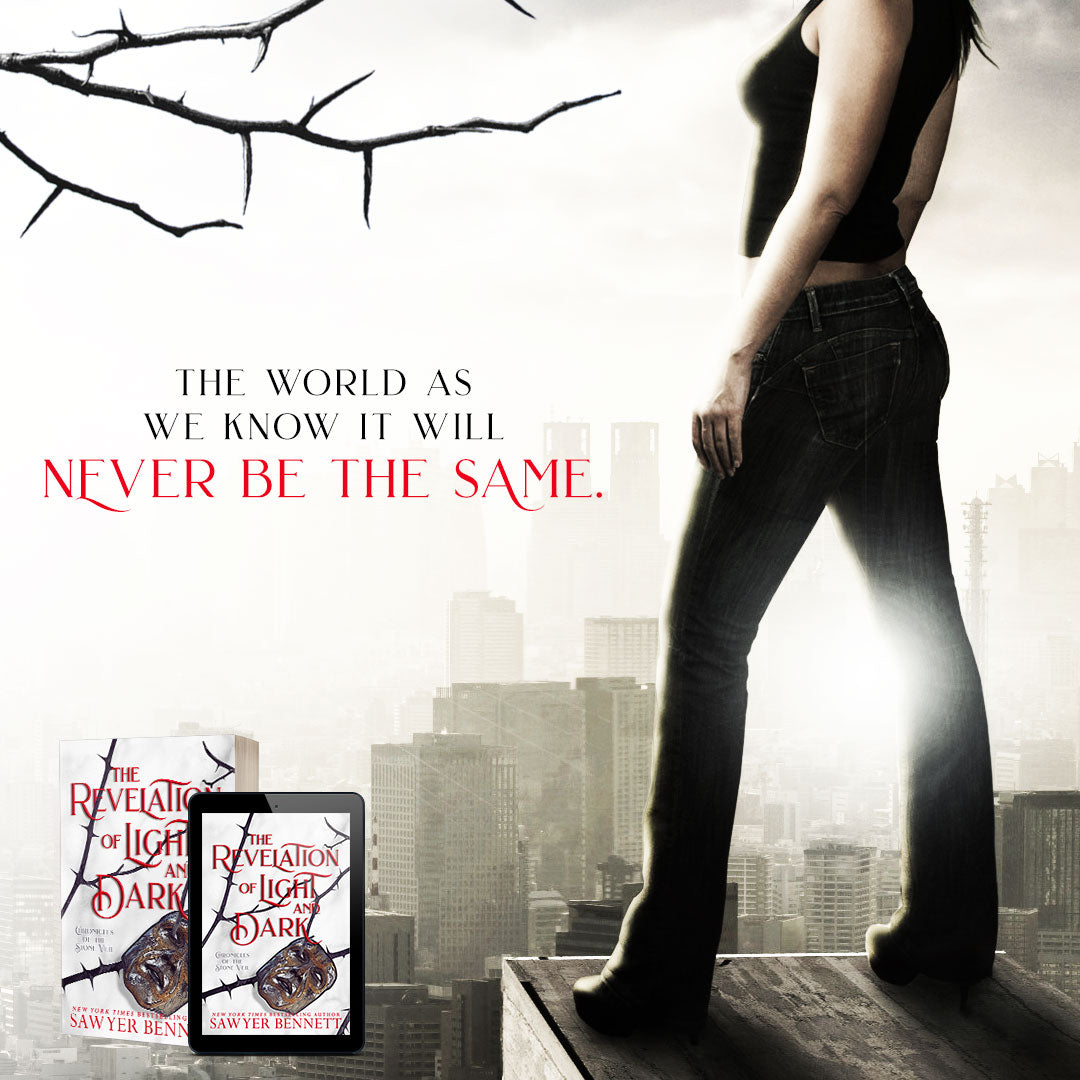
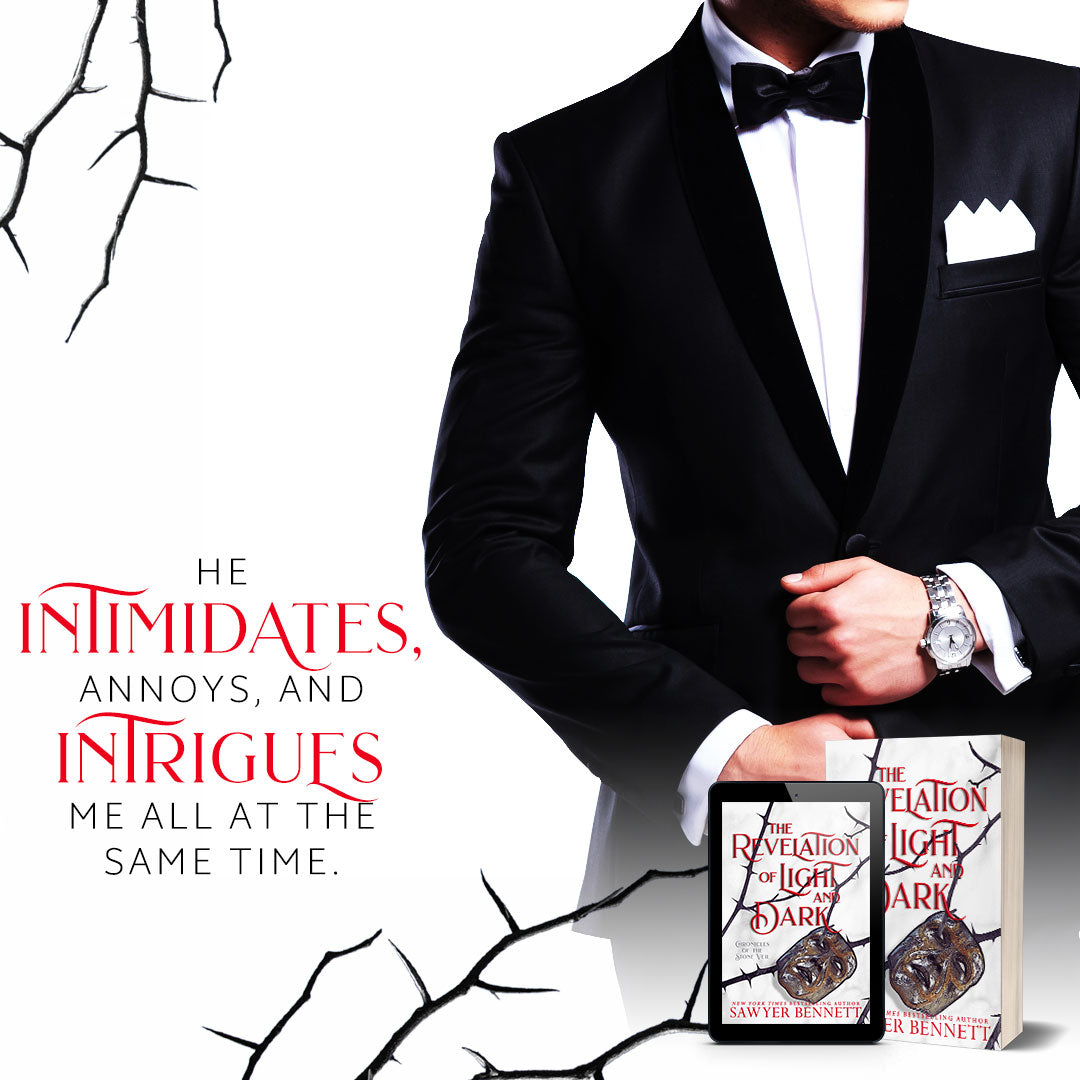
Chronicles of the Stone Veil
The Revelation of Light and Dark (E-Book)
An enemies-to-lovers save the world fantasy romance
⭐⭐⭐⭐⭐ 1,500+ 5 Star Reviews
I always knew I was different.
From a young age, my mind has been plagued with things only I could see. Some hauntingly beautiful, others completely terrifying. Never knowing if these visions were real or just hallucinations, I learned how to lock them down and ignore them. I learned to take solace in the relative anonymity of city life and find peace in the rainy days my city of Seattle is known for.
Read MoreBut just when I think my life is getting on track and my dreams are achievable, a moment of weakness causes me to learn a hard and fast lesson.
My entire existence has been a lie.
Now I’m faced with a new reality that’s as implausible as it is fantastical. Filled with realms and veils, light and dark, fae and daemons, gods and angels—things I don’t understand but am forced to acknowledge. It doesn’t help that the man teaching me about my unique gifts is the gorgeously handsome Carrick Byrne, one of Seattle’s richest and most powerful men. He intimidates, annoys, and intrigues me all at the same time. I don’t trust him and yet there’s no one else to help me.
No longer certain who to put my faith in, what to believe, or how I fit into it all, one revelation is clear…
The world as I know it will never be the same again.
The Revelation of Light and Dark is book one of the Chronicles of the Stone Veil series and is best enjoyed if read in series order.
Read Chapter One
Prologue
Finley
Throughout my life, I never gave much thought about whether evil truly exists. It’s an abstract concept at best, an all too easily applied label at worst. I once took a philosophy course in college about the concept of evil, and I came out of it still not understanding a damn thing.
Is there true evil—like a malevolent spirit within the soul—or do people just do really bad things? After all, evil is the opposite of what is good and moral. Is evil a religious concept or an excuse to justify actions we can’t understand?
I couldn’t figure it out in college, and I never gave it much thought for many years after. But as I stand here next to this gorgeous man who has me tied up in knots—figuratively, not literally—I can see that evil actually has a face.
Something I can readily identify.
Hell, I could touch it if I wanted to, but I don’t want to at all. I want to run so very far away.
The man beside me stands quiet, watching me as I watch evil, and my heart weeps. But I can’t turn to him for comfort because he’s not a kind person. If I were to show weakness—that I’m scared shitless right at this moment—he’d sneer and walk away.
Possibly forever, and despite how much he confuses me on any given day, he’s the only one who can see me through to salvation.
I’m just an ordinary woman and this should not be happening to me.
Ordinary is, of course, subjective. To me, it means living a moderately pleasant life in Seattle, the city where I was born and raised. I own a business, have friends, and I pay my bills. I date with no expectations. If the perfect man comes along, that’s awesome. If he doesn’t, well, that’s okay, too. Life is easy and uncomplicated, which is how I like it.
But that was then.
This is now.
Now, I can see evil and somehow, it’s fallen upon my shoulders to confront it.
I dare to look away, just for a moment, to the man beside me. It’s necessary to tip my head back just to catch his eyes.
It wouldn’t be accurate to say they were the lightest of browns because some days they’re pots of molten gold and others—when he’s exhibiting strong emotion—they shadow to dark amber. Despite the warmth of the color, they are hard and unyielding as they meet mine, and I usually get a cold chill when he stares at me.
“Are you seeing what I’m seeing?” he asks in a guttural voice, his gaze cutting back across the space to what I had just been looking at with horror.
“Yes,” I manage to whisper, my throat all but closed off from fear and confusion.
“Fucking hell,” he murmurs in that calm, cultured tone that he could absolutely use as a weapon of seduction if he thought to do so.
Fucking hell, indeed.
Chapter 1
Finley
5 Weeks Earlier
Opening my bedroom blinds, I glance outside. It’s a glorious morning in Seattle with blue skies peeking through clouds that are white and fluffy on top, and flat as pancakes with a touch of gray underneath. That may or may not mean rain, but I don’t need to look at the forecast. I always carry an umbrella attached to my backpack because rain is a fact of life in the Pacific Northwest.
My eyes catch on my neighbor, Mr. Pelman, as he rolls his garbage can out to the curb for collection. He’s old and stooped and I should really offer to do it for him, but I don’t.
It’s not that I’m a rotten or uncaring person. On the contrary, I try to help anyone I can—my weakness is handing out money to the Seattle homeless whenever I have some on hand. But Mr. Pelman happens to be one of “those” and being in his presence for too long or staring at him too hard causes bad things to happen, and my neuroses will go into overdrive. I’ve worked far too hard to get my mental health in a good place, and I take great care to avoid any of “those” that threaten to make me unstable again.
My father would be proud of me, accomplishing that which he could not. His mental health issues ultimately led to his demise.
I take an extra moment to let my gaze roam my neighborhood, avoiding Mr. Pelman. It’s a mishmash of different types of small houses with tiny yards. There are no sidewalks, the grass growing right to the edge of the road, and most of the driveways are pea gravel. It’s been my ‘hood since the day I was born almost twenty-eight years ago, and I was literally born in this house, right on my parents’ bed. Situated on the northwest side of the city within spitting distance of the Puget Sound, I’m sandwiched between the Broadview and Bitterlake neighborhoods on a street filled with rhodie bushes and tall evergreens.
My home is like most others, a Cape Cod-style built in the late forties. It’s covered in light blue vinyl with dark blue shutters that could use a new coat of paint, and it has a small, uncovered stoop at the front door. The front yard is plain except for a square patch of grass leading to the road and boxwoods along the front foundation. The backyard is where we hang out on nice days as Dad had built a large deck that holds a grill and a four-piece table and chair set along with a flimsy chaise lounge I like to read books on when it’s warm enough and overcast, as my pale skin burns easily. At the bottom of the deck stairs, there’s a rose garden my mother had planted and which my dad and I valiantly tried to maintain over the years, but neither of us have green thumbs. It’s pretty sickly, but I can’t bear to tear it out as I don’t have much of my mother left.
My twin sister Fallon and I inherited this house when my father died. We were only sixteen, and were fortunate to continue to live here under the guidance of a distant aunt who came to live with us until we turned of age. He had enough life insurance to help pay off the mortgage, cover the utilities and other expenses related to two teenage girls, with enough left over to give us both a significant boost to pay for college.
At almost twenty-eight years of age, Fallon now lives downtown with her fiancé in a luxurious condominium, the epitome of success, and I live in this square box of a family home that I love dearly with three cool roommates.
Smiling, I turn from the window, knowing I need to get going. Layers are required in Seattle, because while consistently temperate, the days can start chilly and end warm. It’s the first week of June, which means early fifties in the morning and lower seventies by midafternoon. I shrug a jacket on over my long-sleeved tee, which is under a short-sleeved t-shirt, take a moment to lace on my white low-top Chucks, and head out of my bedroom.
I cross the hall to Rainey’s room—formerly my parents’ bedroom—and knock on it loudly. “This is your wake-up call. Rise and shine, princess.”
She mutters something back, but I don’t wait around to try to decipher it. This has been our routine for about the entire four years we’ve been roommates here, and she’ll stumble out for a cup of coffee in a few minutes. Rainey’s in my parents’ bedroom because I never felt the need to move out of the one I’d grown up in. Even though her room is larger, there’s something about being in the room where my parents were intimate and I was born a squalling mess on their bed, not two minutes after my twin Fallon, that just weirds me out. Of course, that bed is long gone, but still… I’m happy in my childhood bedroom. Even on the cusp of turning twenty-eight, I still have a Foo Fighters poster on the wall above my bed, my hardback set of Harry Potter books I’d saved up for and purchased myself on my shelves, and a small Tiffany butterfly lamp my dad gave me on my sixteenth birthday that sits beside my bed.
It was his last gift to me as he died less than a week later.
In the kitchen, I find Myles at the round table that seats four, head bent over his laptop. He’s in IT and gets lost in coding with a dopey look of pleasure on his face. He’s cute by any woman’s standards with dark hair that’s shaggy and unkempt, with locks that fall adorably across his forehead. His brown eyes always shine warm and inquisitive through his black-framed glasses, and he rarely shaves, so there’s always scruff on his face. It’s not thick enough to grow into a full beard, and at twenty-six, that’s probably not going to change at this point. But still, it presents a roguish kind of cute that totally works.
There’s a bagel on a plate beside his laptop, and I nab it as I walk by.
“Hey, Finley,” he gripes, head popping up. “That’s my breakfast.”
“And it was feeling completely ignored.” I bat my eyelashes to help plead my case for absolution, but he just rolls his eyes at my efforts. Myles has been secretly in love with Rainey for about the same amount of time I’ve been knocking on her bedroom door to wake her up, and he couldn’t care less if I bat my lashes. In fact, I could probably prance around naked, and he wouldn’t give me a second glance. Myles was second to move in after Rainey, and he has been here for just about four years, too.
“I’ll make you another one,” Adira tells Myles quietly from behind the small kitchen counter where she’s pouring me a cup of coffee.
Adira’s the last of my roommates, but she’s only been here a year. While Rainey, Myles, and I have the three bedrooms on the second floor, Adira has settled into the small hobby shop my dad had converted from our detached garage many years ago. He installed baseboard heaters and a small working bathroom with a shower, and he spent a lot of his free time puttering out there—fixing broken things and making little pieces of furniture that were wobbly and adorable at the same time. When I considered adding Adira as a roommate to boost my rental income, I sprang to have the room carpeted for more comfort. She brought her pull-out couch when she moved in, keeps her personal belongings in milk crates, and has been happily, but quietly, living with us since.
She pushes the steaming mug across the counter to me—strong and black, the only way to drink coffee in my opinion—and grabs the bag of bagels to toast another for Myles.
Leaning a hip against the counter, I take a quick sip of the hot java before asking Adira, “Are we carpooling today?”
Adira and I work at the same downtown coffee shop—one of about a few thousand—and we’ll often take turns driving to save gas. That’s how we met and eventually became roommates—I heard she was looking to move out of her ex-boyfriend’s house after a bad breakup.
She shakes her head, her dark wavy locks bouncing. She has the coolest hair. It’s cut in asymmetrical layers, shorter on one side, longer on the other, but never touching her shoulders. She has pretty blue eyes with a light smattering of freckles across her nose and cheekbones. She’s tiny like a waif and while she’s sweet and genuine, it takes a while to get to know her.
“I have a job interview after I get off work,” she explains.
I cock an eyebrow at her. As the manager of the coffee shop where we work together, I’m a little surprised she’d admit such a thing to me.
Noting my expression, she smiles reassuringly. “It’s for a second job doing proofing for a small educational publisher. It won’t take away from my shifts.”
“Phew,” I say with a dramatic swipe of my hand across my brow. “I was fearful for all coffee drinkers I was going to lose one of my best baristas.”
Blushing, Adira busies herself putting cream cheese on Myles’ bagel, which popped out of the toaster.
It’s at this moment Myles sits up straighter in his chair as Rainey shuffles into the kitchen. She has on a blue silk robe wrapped tight around her body, her golden blonde hair quite the mess. Still, she’s one of the most beautiful women I’ve ever had the pleasure of being friends with.
Rainey has one of those perfectly symmetrical faces with large blue eyes and a perfectly straight nose, along with full lips, gleaming, straight teeth, and contoured cheekbones. Her body—just from an unbiased, non-lesbian perspective—is the unrealistic model of perfection every woman dreams about, from her exquisitely shaped breasts to her tiny waist to her long legs.
I’d absolutely hate her for her perfection if I didn’t love the wench so much. After four years as roommates, she’s my closest friend.
My gaze moves to Myles, who shoots her a longing glance. He’s my closest friend, too. To be honest, it’s a draw between them and I hate being the one who holds the secret of his unrequited love. Still, I couldn’t bear to tell Rainey as she’d feel awful not being able to reciprocate, and Myles would be so mortified he’d probably move out.
So I hold my tongue like I always do.
“Okay, nerds,” I announce to my household posse. “I’m outta here. I’m thinking of grilling some burgers tonight, so I need to know who’s in.”
I’m the household cook. Long ago, we divvied up responsibilities and since I was the best at cooking, I became the resident chef and chief grocery shopper. Rainey, Myles, and Adira have a system worked out for cleaning the house, and they all three chip in to cover the groceries.
“I’m out,” Adira says, and I figured as much if she has a job interview after work. “I’ll just grab something downtown.”
“I’m in,” Myles says, his attention now back on his laptop. Adira brings him the bagel she’d just prepared. He ignores it like he did the one before it, but that’s just the way he gets wrapped up in his work.
“I’m in, too,” Rainey mutters as she sips at the coffee she just poured. It takes her a while to wake up and function. She works in the mall as head of the makeup section in a fancy department store. Unlike me, she has a college education. Like me, Rainey’s happy doing what she’s doing and not aspiring toward a more ambitious and lucrative career. Deep down, she’s just waiting to land the right rich man who will keep her in lavish comfort, and I can respect that ambition.
I wolf down the rest of my bagel and coffee, grab my backpack by the side door off the kitchen, and head out to my car.
Since this is my house, I get privileges of parking in the gravel driveway that runs right up to the detached garage that serves as Adira’s room. The only real perk is I’m a few feet closer to the door. Rainey and Adira park on the street, and Myles has never owned a car. He either takes the bus or bikes wherever he needs to go.
I love my car. It’s a Subaru Forester in the coolest metallic gray-green color I’ve ever seen. It’s eight years old, and I got it for a great price. It’s been a trusty mode of transportation, and even though traffic in Seattle is some of the worst in the world, I love driving the jam-packed freeways into downtown. It helps me polish my skills of observance, calm steadiness, and the ability to make dangerous maneuvers without hesitation by slipping into the next lane when needed. Not sure when I would ever need such skills outside of driving the Seattle freeways, but they’re nice, shiny, and ready for use.
I’m less than a mile from 99—also known as Aurora Avenue—which is a straight shot south into downtown where I work. It’s roughly an eleven-mile trip that can sometimes take me an hour, depending on rush-hour traffic. It’s my time to gear up for the day, though, and I jam to the prince of Seattle, Kurt Cobain, as I make a mental list of tasks I need to accomplish at the coffee shop.
Just before I cross the Aurora Bridge, it starts to rain, and my hands go white-knuckled on my steering wheel. I flip on my windshield wipers, grimacing each time they lift as they make a horrible squeaking sound. While I love the rain of the PNW, it makes the metal grating of the Aurora Bridge slippery as hell and causes my anxiety to go sky high when I have to travel over it. It’s the thing I hate about my city the most and all of my daredevil, rush-hour traffic maneuvers grind to a halt as I slow my speed down to a near crawl, clearly pissing people behind me off.
As I inch across the bridge, I ponder that what I do love about Seattle can’t be found in tourist attractions or guidebooks. It’s the cultural diversity that attracts me to stay here despite the bad traffic and rainy weather. It’s the environmental conscience of most of the residents, a shared love and commitment to keep our planet healthy and whole. It’s the vibrant art scene and gorgeous scenery that’s unparalleled. Sure, call me a granola cruncher, but there’s not a lovelier place in the world to live than my city, especially on a clear day when you can see west across the Puget Sound to soaring views of the Olympic Mountains, or the even clearer days when Mount Rainier shines from the south with its snowcapped peak. I’ve heard that it can even be seen as far away as Oregon and British Columbia, but I’ve not seen that with my own eyes, mainly because I’m not much of a traveler.
Of course, that’s more by circumstance than desire, as I pretty much live hand to mouth working as a coffee shop manager in an expensive city and am too poor to travel.
I park in a garage two blocks from where I work. There’s a light mist—nothing that could actually be called rain—so I leave my umbrella tucked away as I move with the pedestrian crowd. It’s not enough to get my clothes wet, but the mist will wreak havoc on my hair.
My dad always used to say, “Finley… if you love what you do, you’ll never work a day in your life”.
I know that to be true because I really love my job and never think it’s a burden in any way. I even get a little squeeze of fondness in my heart when the front door of the coffee shop comes into view.
It’s called One Bean, and it’s the most amazing place ever.
Recessed in between a pharmacy and a small branch bank on 6th Avenue, the exterior is a worn red brick. The front door is solid wood on the bottom, painted black, with paned glass on the top. Just above the door is a small sign in white cursive lettering that says One Bean. I’m sure many marketers would frown on such a horrible effort of getting the shop noticed, especially since it’s recessed inward by about ten feet, but the owner was far smarter than they’d expect. As the shop itself is two stories, there’s a small balcony above the door that holds two tables where patrons can sit on a nice day. It’s bordered with black wrought-iron railing and attached to the exterior of said railing is the word COFFEE, done in marquis lettering three feet tall and blazing with light bulbs along each letter.
Edison light bulbs are also strung across the width of the recessed space, crisscrossed back and forth, and it provides for a magical atmosphere at night. I freaking love this place.
We open at six for the early morning commuters, and my day-shift manager, Lisa, has the place in tip-top shape by the time I walk in at eight. The interior is packed, and three espresso machines are chugging behind the counter at the same time. Glass cases on either side of the two registers showcase a delicious array of pastries, muffins, yogurts, granolas, cookies, breads, and other sweet edibles to have with coffee—or tea for the weird ones.
Glancing around with pride, I take in every filled table. The inside of One Bean is as charming and eclectic as the outside. The walls are the same worn red brick, and the flooring is reclaimed pine. The tables are bleached oak, and the chairs have the same matching wood on the seats, but the back and legs are painted black. Immediately to the left of the entrance is a floating staircase that leads up to the second floor, which has about half the space as the first floor. It’s a popular spot, and I know there won’t be an empty seat up there either.
I make eye contact with Lisa, who has been at One Bean for almost five years now. She wears her hair shorn into a buzz cut, which one might think would make her look mannish. On the contrary, her face is delicately feminine, and her makeup is so expertly applied that it enhances her beauty. She is always wearing some type of floating, gauzy dress, usually patterned in flowers or butterflies, giving her a bit of a hippie vibe. This totally contradicts all the piercings in her face—at least seven or eight in each ear, an eyebrow bar, a nose ring, and a stud on the outside of her lower lip. She’s like a patchwork of different styles, which is another reason I love working here. We aren’t required to wear uniforms, and we’re encouraged to be ourselves.
Lisa’s working behind the counter, and she gives me a chin lift. I point to the bathrooms down a short hall to the right, then to my hair. She grins, knowing exactly what I mean, given the weather outside and my unruly mop.
Weaving through the line of customers waiting to place their order, I head into the women’s bathroom. Same red brick walls and pine floors. Amber-colored bowl sinks are set into a wooden vanity with two stalls done in lacquered black paint.
It’s empty and as I step up to the mirror, I blow a frustrated sigh out of my mouth. Placing my backpack on the wooden top, I fish out a hair tie.
My mom was a redhead like me, but I only know that from the stories my dad tells or by old pictures of her. But my red is a bit different.
“Like fire,” my dad would always exclaim with pride. It’s vivid, bright, and loud.
And there’s a bunch of it. It hangs midway down my back and despite the fact I rarely cut it, it has various layers. Moreover, my hair can’t decide which way it wants to behave. Half is a mass of coiled curls that, when pulled taut, would reach my butt. The other half is merely wavy. When the two intermix, it makes for a crazy, hard-to-tame mane—and that’s on a good day. It’s impossible to manage on a misty day.
As such, I gather it up into a huge messy knot on top of my head. A few of the wavy shorter pieces fall out and frame my face.
I take a second to study said face, knowing I look like my mom there, too. Classic heart-shape, pale skin, adequately full lips, and I was blessed with the best eyebrow shape in the history of women’s eyebrows. They are delicately arched and rarely need to be plucked.
My most striking feature, by far, is my eyes, but far be it from me to be the one to laud my peepers. So many people comment on them—even strangers stop me on the street. From a few feet away, they are a strange bluish-green tint. Up close though, the colors don’t actually mesh but are differentiated. Close to my pupils are rings of gold, which striate into a circle of green, which melts into an outer border of blue. In my life, I’ve never seen another person with eyes like mine and sometimes that can make me feel overly strange.
My dad used to say that on the night I was born, an angel shot a bolt of magic into me, which fried my hair into curls and filled my eyes with the heavens.
Of course, my dad was nutters, so it wasn’t something I believed. I just found it to be charming.
Finished with my perusal, I leave the women’s bathroom and step across the hall to the office. I’m the only one other than the owner who has a key, and I unlock it to open the door enough to toss my backpack inside. The other employees have lockers in the small break room at the end of the hall. After locking it back up, I head to the heartbeat of the shop.
I make my way behind the counter where magical coffee dreams are made and money is collected.
I greet each of the employees by name and with a smile. I’m a good boss, overly genial and fair. I can be hard when warranted—such as come in late three times and the fourth, the employee would see the temper of a redhead—but for the most part, it’s a very chill work environment.
We have two cash registers and only one person working them, so I step up to the unmanned one and turn the key to fire it up. The line splits, and customers come over to me.
Looking up from the register, I greet the first one with a bright, cheery smile. “Welcome to One Bean. What can I get…”
My words trail off because my stomach sours, and my heart starts pounding as I take in the customer before me.
To every other person in this shop, he looks normal enough—a morning commuter dressed in slacks and a nice button-down with a crew-neck sweater over it. It’s the standard attire for most businessmen downtown and you rarely see men or women in expensive, tailored suits. Seattle’s just way too casual for that. He has a briefcase in one hand and a phone in the other. Ordinary face, brown hair, and brown eyes.
But as I take him in, I don’t have to look hard to know there’s something wrong with him. The vibe I’m getting—while making me distinctly nauseous—is cold, hard… maybe even psychopathic.
I could see him with clearer eyes if I so chose, but I tamp down on that particular gift. It’s not a pleasant experience. Like Mr. Pelman, he’s one of “them” and I learned my lesson where “they” are concerned a long time ago. The less I know, the better. It’s bad enough knowing my dad was a little crazy—I don’t want anyone thinking the same about me. And I definitely don’t want to believe that about myself anymore.
I lock myself down tight, even as a cold sweat chills my body. My vision glazes slightly as I look at him, a cheery smile still in place. “Sorry… what can I get you today?”
He gives his order, which I write on the cup. His voice is hard and gravely, his tone just short of snide. In just that short meeting, I can tell he’s a jerk to most people but that’s not the reason I’m experiencing fear. That’s just surface personality. It’s what lies beneath that has my knees shaking just slightly.
His name, so normal… Dan. If he had a knife in hand and no witnesses, I bet he’d take pleasure in slitting my throat.
And I hate that I know that about him.
I take his money, careful not to touch his fingertips, and hand over his change. I avoid obvious eye contact the entire time, instead keeping a hazy awareness of his body in general. My mouth feels like it’s going to crack as I desperately hold onto my smile.
When he steps to the side to await his order, my gaze lowers to the cash register. I let out a long exhale, returning it immediately with a calming breath.
I lift my head, welcoming smile back in place, and ready myself to greet the next customer.
“Shit,” I mutter when I see the woman standing before me.
My twin sister, Fallon.
“We need to talk,” she says.
Important! Refund policy - please read prior to purchase
Digital items (ebooks and audiobooks): Because digital items are delivered immediately, no refunds will be given for these products. If you experience technical difficulties downloading/accessing your ebook or audiobook, please contact help@bookfunnel.com.
In the event of a duplicate purchase, please email sawyer@sawyerbennett.com for a refund.
Paperback/Hardcover books: Due to the personalized nature of these products, signed paperbacks and hardcovers are non-returnable. If your shipment is damaged upon arrival, please contact sawyer@sawyerbennett.com to discuss exchange/replacement options.
Digital Purchase Delivery
- Complete your e-book purchase.
- Check your email! BookFunnel will send directions on how to get your book(s).
- Send e-books to the e-reader of your choice and start reading!
If you experience issues with the delivery of your e-books to your device, please contact help@bookfunnel.com for assistance.
Release Date:

The Revelation of Light and Dark (E-Book)
NEW SERIES!
The Bluegrass Empires
Set among the rolling hills of Kentucky horse farms and bourbon distilleries, these seductive tales are steeped in bloodline feuds that run deep and without forgiveness.
